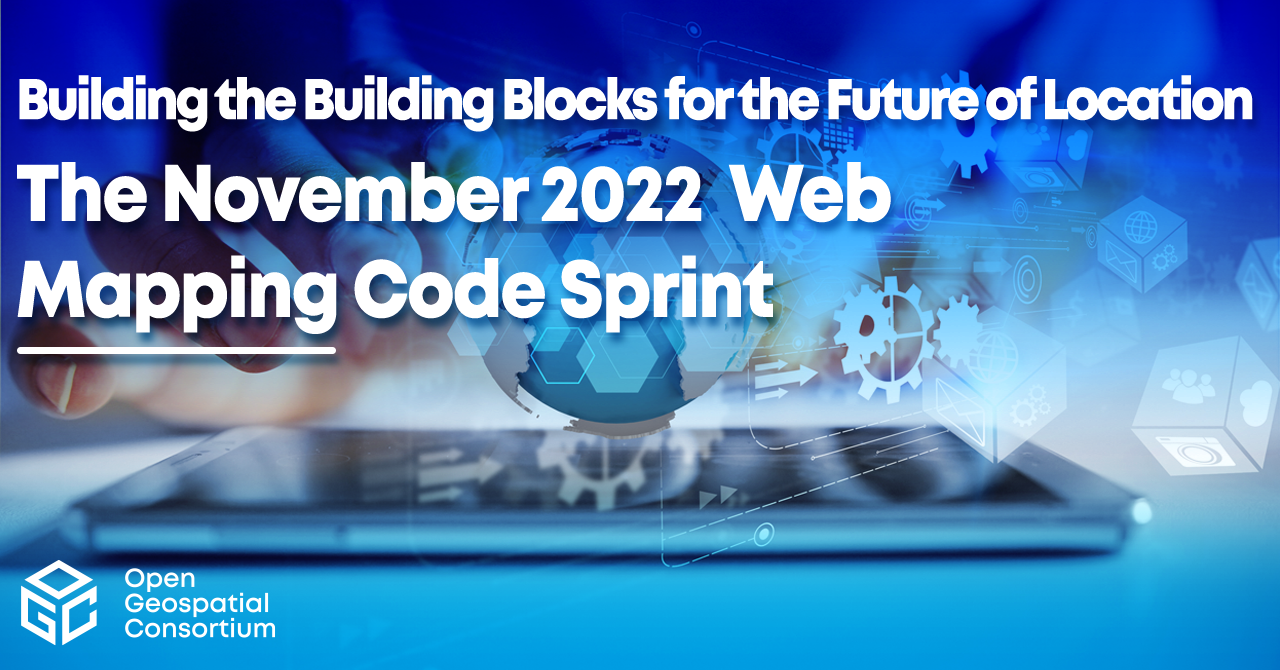The mechanisms through which maps are delivered across the Internet have evolved significantly over the past two decades. Advancement of such mechanisms has been driven by a combination of factors. New data formats have emerged, the SWaP-C (size, weight, power, and cost) of devices has improved, and the capabilities of web browsers have been enhanced by improvements brought by HTML5. This means that some of the functionality that web mapping applications could not implement in a standardized way, are now becoming increasingly common.
To support the development of OGC API Standards, the building blocks for location that standardize many of the new capabilities available to web mapping applications, the Open Geospatial Consortium (OGC) and EuroGeographics hosted the 2022 Web Mapping Code Sprint from November 29th to December 1st, 2022. The event was sponsored by OGC Strategic Member, Ordnance Survey, and was held as a hybrid event, consisting of a virtual element hosted on the OGC’s Discord environment alongside an in-person element hosted by EuroGeographics in Brussels, Belgium.
Code Sprints experiment with emerging ideas in the context of geospatial Standards, help improve interoperability of existing Standards by experimenting with new extensions or profiles, and are used for building proofs-of-concept to support standards-development activities and the enhancement of software products. Non-coding activities such as testing, working on documentation, or reporting issues are also conducted during a code sprint. In addition, the code sprints’ mentor stream provides an excellent opportunity to onboard developers new to the Standards.
The 2022 Web Mapping Code Sprint focused on the following:
- OGC API – Tiles Standard: This Standard describes API building blocks that can enable implementations to serve map tiles, vector tiles (tiled feature data) or tiled coverage data.
- OGC API – Maps candidate Standard: This candidate Standard describes API building blocks that can enable implementations to serve spatially referenced and dynamically rendered electronic maps.
- OGC API – Styles candidate Standard: This candidate Standard describes API building blocks that can enable implementations to manage and fetch styles that consist of symbolizing instructions that can be applied by a rendering engine to features and/or coverages.
- OtherStyles & Symbology Encodings (e.g., SLD, SymCore, etc.)
The mentor stream of the code sprint featured two tutorials, about understanding and using one server side and one client side implementation of OGC API – Tiles. It also included two onboarding sessions, focused on collaborating in software projects that implement the standards.
The code sprint successfully facilitated the development and testing of prototype implementations of OGC API Standards, including candidate Standards, that relate to web mapping. Further, the code sprint provided a foundation for the development of the next version of the Symbology Core Standard. Participants were able to provide feedback directly to the editors of the Standards and the editors were able to clarify any issues encountered by the sprint participants and the sprint also raised awareness about the Standards. The code sprint therefore met all of its objectives.
OGC is an international consortium of more than 500 businesses, government agencies, research organizations, and universities driven to make geospatial (location) information and services FAIR — Findable, Accessible, Interoperable, and Reusable. The consortium consists of Standards Working Groups (SWGs) that have responsibility for designing a candidate Standard prior to approval as an OGC Standard and for making revisions to an existing OGC Standard. The sprint objectives for the SWGs were to:
- Create awareness about OGC Standards;
- Develop prototype implementations of OGC Standards, including implementations of draft OGC Application Programming Interface (API) Standards;
- Test the prototype implementations;
- Provide feedback to the Editor about what worked and what did not; and
- Provide feedback about the Standards and candidate Standards.
EuroGeographics is a not-for-profit organization that represents many of the National Mapping, Cadastral and Land Registration Authorities across Europe. The organization facilitates access to data, services, and expertise, as well as supporting the sharing of knowledge across the continent. The organization also publishes a product called Open Maps for Europe, which provided a useful resource for sprint participants. For example, within the first day of the code sprint, the sprint participants had implemented an OGC API -Maps façade in front of a Web Map Service (WMS) that was serving maps from the Open Maps for Europe product.
Ordnance Survey (OS) is the National Mapping Agency of Great Britain. OS publishes printed and digital maps, as well as offering access to the maps and data through a variety of APIs. In September 2022, OS launched the OS NGD API suite of products that implement a number of OGC API Standards. The Web Mapping Code Sprint therefore provided an opportunity for OS to directly support the advancement and implementation of the OGC API Standards on which the new OS NGD API products are built. The code sprint also provided an opportunity for OS engineers to directly engage with the editors of the Standards. Such access to editors and SWG members greatly accelerates development of applications.
Several more OGC Code Sprints are planned for the year 2023. To keep up to date with the latest plans, please visit https://www.ogc.org/projects/initiatives/ogcsprints
